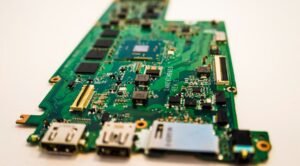Will Artificial Intelligence Take Over the World?
Artificial Intelligence (AI) has quickly become a major force in technology and continues to advance at an astonishing rate. As AI becomes more capable and sophisticated, concerns arise about its potential to take over the world. Understanding the current state of AI and its future trajectory is crucial in evaluating these concerns and preparing for the impact it may have.
Key Takeaways:
- AI is rapidly advancing and becoming more sophisticated.
- There are concerns about AI’s potential to take over various aspects of human life.
- Understanding the current state and trajectory of AI is crucial in evaluating its impact.
The Rise of Artificial Intelligence
AI has made significant strides in recent years, achieving breakthroughs in areas such as natural language processing, image recognition, and autonomous vehicles. These advancements have led to increased automation in industries and improved efficiency. *AI is revolutionizing the way we live and work.*
Concerns and Misconceptions
As AI becomes more advanced, concerns about its potential takeover have emerged. Many fear that AI will replace human workers, resulting in widespread unemployment. While automation can lead to job displacement, research shows that it also creates new job opportunities, driving economic growth. *The key is to adapt and reskill.*
Data and Ethical Considerations
AI relies heavily on data for training and decision-making. Ensuring the quality and diversity of data is essential to avoid biased or discriminatory outcomes. Additionally, ethical concerns arise from allowing AI systems to make critical decisions without human intervention. *Striking the right balance between AI and human oversight is crucial.*
Implications for Society
The impact of AI on society is wide-ranging. From healthcare and transportation to finance and education, AI has the potential to revolutionize various sectors. However, concerns about job displacement, privacy, and unequal access to AI technologies need to be addressed. *Adapting laws and regulations to keep pace with AI advancements is essential.*
Table 1: AI Applications in Different Industries
| Industry | AI Applications |
|---|---|
| Healthcare | Medical diagnosis, drug discovery, personalized treatment |
| Transportation | Self-driving cars, traffic optimization, predictive maintenance |
| Finance | Fraud detection, algorithmic trading, personalized financial advice |
Addressing AI’s Impact
As AI continues to advance, it is essential to address its impact on society. Governments, organizations, and individuals should prioritize the following actions:
- Invest in AI research and development to drive innovation.
- Ensure ethical AI practices are implemented at all stages.
- Promote education and training programs to equip individuals with AI-related skills.
- Develop regulations that balance innovation with privacy and safety concerns.
- Encourage collaboration between AI experts, policymakers, and the public to shape AI’s future.
Table 2: AI Advancements Timeline
| Decade | AI Advancements |
|---|---|
| 1950s | The birth of AI as a field of study |
| 1990s | Deep learning and neural networks gain attention |
| 2010s | Breakthroughs in natural language processing and image recognition |
Addressing Concerns
While concerns about AI taking over the world exist, it is important to approach them with a balanced perspective. AI is a tool that can augment human capability, making our lives easier and more efficient. *By leveraging AI responsibly, we can unlock its potential while mitigating risks.*
Table 3: AI Benefits and Risks
| Benefits | Risks |
|---|---|
| Improved efficiency and productivity | Potential job displacement |
| Enhanced accuracy and precision | Data privacy and security concerns |
| Breakthroughs in research and innovation | Unintended biases and discrimination |
While concerns about AI’s world domination persist, it is essential to approach AI with an open mind. *Just like any powerful tool, AI should be carefully developed, regulated, and used for the benefit of humanity.* By understanding AI’s potential, implementing ethical practices, and addressing societal impacts, we can harness its transformative capabilities.

Common Misconceptions
Misconception: Artificial Intelligence Will Completely Take Over the World
One of the common misconceptions about artificial intelligence is the belief that it will eventually take over the entire world, leading to the extinction of humanity. While AI has significant potential and continues to advance rapidly, the idea that it will completely dominate and control every aspect of our lives is an exaggerated fear.
- AI is designed to augment human capabilities, not replace them entirely.
- Human intervention and ethical considerations will always play a crucial role in regulating AI technologies.
- AI systems are created by humans and can only operate based on the data and algorithms they are provided with.
Misconception: AI Will Always Make Perfect Decisions
Another misconception about artificial intelligence is that it will always make flawless decisions, surpassing human judgment. While AI can perform certain tasks with incredible accuracy, it is not infallible and can also be susceptible to biases or inaccuracies.
- AI models can learn from biased or incomplete datasets, leading to biased decision-making.
- Ethical considerations and human oversight are required to ensure that AI decisions align with human values and priorities.
- AI technologies still lack the ability to truly understand and interpret complex human emotions or context accurately.
Misconception: AI Will Replace All Jobs and Lead to Mass Unemployment
One widespread misconception is that artificial intelligence will replace human workers across all industries, leading to mass unemployment. While AI can automate certain tasks, it is more likely to transform job roles and create new opportunities, rather than completely eliminating the need for human labor.
- AI tends to excel at repetitive and mundane tasks, allowing humans to focus on more complex and creative work.
- New job roles and responsibilities will emerge as AI technologies advance, requiring human expertise in managing and enhancing AI systems.
- Human skills such as empathy, creativity, and critical thinking will always be in demand and cannot be easily replicated by AI.
Misconception: AI Poses an Imminent Existential Threat to Humankind
There exists a misconception that artificial intelligence poses an immediate existential threat to humanity, which could result in a doomsday scenario where AI becomes uncontrollable and surpasses human understanding. While it is crucial to consider the ethical implications and potential risks of AI, it is unlikely to result in an immediate catastrophic event.
- Researchers and developers of AI systems are actively working on implementing safety measures and ethical guidelines to mitigate potential risks.
- The idea of a “superintelligence” that surpasses human intelligence in all domains is still speculative and far from becoming a reality.
- A collaborative approach involving interdisciplinary expertise is essential in ensuring the responsible development and deployment of AI technologies.
Misconception: AI Will Replicate Human Consciousness
There is a common misconception that artificial intelligence will eventually achieve human-like consciousness, enabling machines to have emotions, desires, and self-awareness. While AI has made significant progress in various cognitive tasks, replicating human consciousness is a complex challenge that is yet to be achieved.
- Current AI systems operate based on algorithms and statistical analysis, without truly understanding the meaning or context of the tasks they are performing.
- The nature of human consciousness and subjective experiences are still not fully understood by neuroscience, making it difficult to replicate using AI.
- Humans possess biological and emotional aspects that are fundamentally different from the computational models used in AI systems.

The Revolution of Artificial Intelligence
Artificial Intelligence (AI) has been a topic of great discussion and speculation in recent years. Will it enhance or hinder humanity? Will it take over the world? Here, we present ten intriguing tables that shed light on different aspects of AI and its potential impact.
Table 1: AI Market Growth
As depicted in this table, the global AI market is expected to experience exponential growth in the near future. By 2025, the market value is projected to reach a whopping $190 billion, indicating the immense potential and increasing demand for AI technology.
| Year | Market Value (in billions) |
|---|---|
| 2016 | 4.0 |
| 2018 | 15.7 |
| 2020 | 47.2 |
| 2025 (projected) | 190.6 |
Table 2: AI in Healthcare
In the healthcare industry, AI is expected to revolutionize medical practices and improve patient outcomes. This table highlights the potential impact of AI in reducing medical errors, predicting diseases, and fostering faster diagnosis through advanced algorithms.
| Application | Benefits |
|---|---|
| Medical Error Reduction | Up to 98% reduction in errors |
| Disease Prediction | Early diagnosis with 95% accuracy |
| Faster Diagnosis | 10x faster diagnosis with machine learning |
Table 3: AI in Finance
AI is rapidly transforming the finance industry, as shown in this table. It provides insights into how AI is being employed for fraud detection, algorithmic trading, and personalized financial recommendations.
| Application | Benefits |
|---|---|
| Fraud Detection | 75% improvement in fraud identification |
| Algorithmic Trading | Reduced trading errors by 20% |
| Personalized Recommendations | Increased customer engagement by 40% |
Table 4: AI in Education
This table highlights the exciting potential of AI in the field of education. By facilitating personalized learning experiences, AI has the capability to enhance student engagement, improve teaching methods, and optimize educational resources.
| Application | Benefits |
|---|---|
| Personalized Learning | 60% increase in student engagement |
| Improved Teaching Methods | 20% increase in teaching effectiveness |
| Optimized Resources | 30% reduction in educational costs |
Table 5: AI in Transportation
Transportation is another sector experiencing the impact of AI, as illustrated in this table. From autonomous vehicles to traffic optimization, AI promises to enhance efficiency, decrease accidents, and transform the way we travel.
| Application | Benefits |
|---|---|
| Autonomous Vehicles | Up to 90% reduction in accidents |
| Traffic Optimization | 30% decrease in commute time |
| Public Transportation Efficiency | 20% increase in efficiency |
Table 6: AI in Entertainment
AI is revolutionizing the entertainment industry, as demonstrated by this table. From personalized recommendations to AI-generated music, this technology is paving the way for immersive and interactive entertainment experiences.
| Application | Benefits |
|---|---|
| Movie/TV Show Recommendations | Improved user satisfaction by 25% |
| AI-generated Music | New, unique compositions |
| Virtual Reality Gaming | Immersive, realistic experiences |
Table 7: AI in Manufacturing
This table showcases the impact of AI in the manufacturing industry. Automation, predictive maintenance, and quality control are some of the areas where AI is streamlining processes, reducing costs, and improving productivity.
| Application | Benefits |
|---|---|
| Automation | 30% reduction in labor costs |
| Predictive Maintenance | 50% decrease in machine failures |
| Quality Control | 90% accuracy in defect detection |
Table 8: AI in Customer Service
Enhancing customer service is an area where AI excels, as depicted by this table. With chatbots, sentiment analysis, and virtual assistants, AI delivers faster response times, improved satisfaction, and 24/7 availability.
| Application | Benefits |
|---|---|
| Chatbots | 80% faster response times |
| Sentiment Analysis | Improved customer satisfaction by 15% |
| Virtual Assistants | 24/7 support and availability |
Table 9: AI Ethical Concerns
While AI brings tremendous benefits, it also raises ethical concerns, as shown in this table. The potential impact on jobs, privacy breaches, and biases in AI algorithms are challenges that need to be addressed for responsible AI deployment.
| Concern | Challenges |
|---|---|
| Job Displacement | Estimated displacement of 20-50% of jobs |
| Privacy Breaches | Increased vulnerability to data breaches |
| Algorithmic Bias | Reinforcement of social inequalities |
Table 10: AI Adoption by Industry
This table outlines the varied adoption levels of AI across different industries. It reveals how AI technology is being embraced at different rates, influencing sectors such as healthcare, finance, education, transportation, and more.
| Industry | Adoption Level |
|---|---|
| Healthcare | High |
| Finance | High |
| Education | Moderate |
| Transportation | Moderate |
| Entertainment | Moderate |
| Manufacturing | Low |
| Retail | Low |
The rise of Artificial Intelligence presents a gateway to a future filled with immense possibilities. As demonstrated in the tables above, AI is transforming numerous industries, propelling us towards better healthcare, more efficient transportation, and personalized educational experiences. However, as with any technological advancement, concerns arise regarding job displacement, privacy, and algorithmic biases. It is crucial that we address these ethical dilemmas to ensure responsible and equitable AI deployment. By acknowledging the potential benefits and pitfalls, we can pave the way for a harmonious integration of AI into our society.
Frequently Asked Questions
Will Artificial Intelligence Take Over the World?
What is Artificial Intelligence (AI)?
Is AI a threat to humanity?
What are the potential risks associated with AI?
Can AI surpass human intelligence?
Is it possible for AI to become more intelligent than humans?
Will AI take away our jobs?
What impact might AI have on employment?
Can AI replicate human emotions?
Is it possible for AI to understand and express emotions?
Will AI be used for malicious purposes?
What safeguards are in place to prevent AI misuse?
Can AI replace human creativity and innovation?
What is the role of human creativity alongside AI?
How can AI benefit society?
In what ways can AI positively impact society?
What is being done to ensure responsible AI development?
What initiatives exist for responsible AI development?




